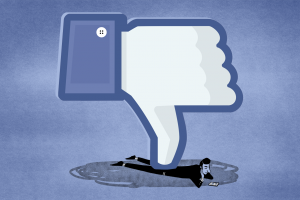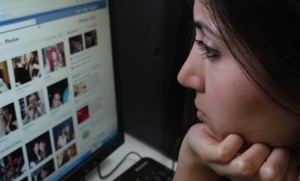Has Facebook lead to an increase in depression?
Americans spend hundreds of hours of their lives on social media and Penn State students are certainly no exception. Most people never think twice about pulling out their phone to see what’s going on with their friends and family, but maybe we should. While posting on your friends timeline or scrolling through your news feed seem like harmless activities, studies show they may be leading you to towards a state of depression.

For years scientists have seen this correlation, but a recent study published in the Journal of Social and Clinical Psychology may have found the causality. They determined the link between social media and depression to be social comparison. The conclusion was that people make comparisons between the worst parts of themselves and the best of others, damaging their self confidence and leading them towards depression
Now the question is, what do we do? One could argue that not using social media anymore would be the best solution, but social media does have its perks. It keeps people connected, entertained, and makes events and pictures much easier to share. I believe the best thing to do is come to the understanding on you’re own that what you see on social media is not an accurate description of the lives of those around you. That way, you don’t compare the worst of yourself to the best of others. I think this approach would be much more effective than a ban on social media like the ones many school systems are using. If instead of blocking social media, schools educated students about how to approach it in a healthier manner, students might actually learn a lesson instead of just postponing their depression until they’re home from school.
There is much more to this debate about social media in school, more information about the pros and cons can be found here.
There is also another issue linking social media to depression. Stephanie Mihalas, PhD, a psychologist and a clinical instructor in the department of psychiatry and biobehavioral sciences at the David Geffen School of Medicine at UCLA believes social media can trap people in a dangerous cycle. She has discovered that people often use Facebook and other social media to try and escape depression, but the constant surfing of social media often is the root of the unhealthy emotions. She argues that being on social media keeps those already struggling with depression secluded, remote, and less attuned to the real world around them.
Social media is not all bad, but next time you’re scrolling through your news feed, be sure it is bringing out heathy emotions, not damaging your self esteem.



I think this blog is so relatable to today’s world. I never had Facebook until a few months ago, mainly because I felt there was no need for it. I only got one to connect with other Penn State students- which is one of the benefits of Facebook. Unfortunately though, we use Facebook also to look at everyone else’s “glamorous” lives. It’s so hard for people (including myself) to see that the life people portray on social media is not the life they are truly living. Social media is the place to post what you WANT people to see. Facebook is not the only sight to influence this. Other social media, especially Instagram, are sights that often give people false assumptions of people’s lives. This usually leads to jealously and issues in self-esteem. Social media has its benefits but it sure does have its downsides.
I agree wholeheartedly with this post. As a college freshman, I constantly log onto social media sites and scroll through hundreds of different posts highlighting all of my friends’ new college lives. However, I know some people who have actually struggled deeply with their transitions into college this past month, and who have used their social media as a front to make them seem “normal.” But in all honesty, is there really a normal way to be a college freshman? I think social media really discourages originality, and makes us forget that we all have our own unique ways of adapting to new situations, i.e. college. However, I personally don’t think this is a reason to block social media sites at a school/ on a campus. At my high school, the technology department did just that, and a large portion of students’ time was dedicated to hacking the system or getting around the firewalls. I honestly see the best solution to this problem being our ability to adapt to the falseness of social media, because technology is thriving and there is no sense in backtracking. Here is an article encouraging us all to get real on social media…maybe getting real will help alleviate the depression the comes with it!
Article Link
This is such an insightful blog, and I’m so happy that as young adults we can realize the damages that our beloved social media can cause. I love social media as much as the next girl, especially instagram. I see pictures of people’s vacations, celebrity selfies, and gorgeous plates of food that make me extremely envious sometimes. Social media can definitely give us some serious FOMO, and I have even caught myself a couple times only taking a picture of something for the mere purpose of “putting it on the gram”. Its easy to forgot that just how we sometimes fake how cool our social media life is, other people we follow are doing the exact same things. Sometimes we need to take a step back and realize there is more to an experience than figuring out how to post it, and realize that every one is trying as hard as we are to have perfect feeds. Here is a post about one of my favorite instagrammers who made a statement when she admitted to the internet that her life wasn’t as perfect as she had tried so hard to make it seem.
-Dana
I found your blog post really interesting because it is completely true. Living in a society where social media controls everything can be time consuming and bad for us. It can make us jealous and envy others by consistently watching posts. I feel like as the years go on the social media addicted generations are getting younger and younger due to technology being such an important aspect in our lives. Here is a link explaining the problem of social media in our society I found. http://www.computerworld.com/article/3014439/internet/social-media-addiction-is-a-bigger-problem-than-you-think.html
I actually wrote my senior year research paper on this exact topic for my english class. I compared this study with the plot line of the popular television show, “Gossip Girl”, to explain that social media may in fact be hindering teenagers’ self esteem and perceptions of themselves. In this show the characters are constantly checking into the blog “Gossip Girl” to catch up on the latest gossip and updates of their friends and enemies. My paper was about how this show started an addictive social media trend. Studies have shown that chronic and obsessive use of social media can cause teens to feel bad about or think less of themselves because they compare themselves to their peers. Various other ways it can affect the mental health of teenagers can be further explained here . This article explains the negative effects of social media include cyberbullying, the increased feeling of being left out, comparison of oneself to others, and the glamorization of drug and alcohol use.